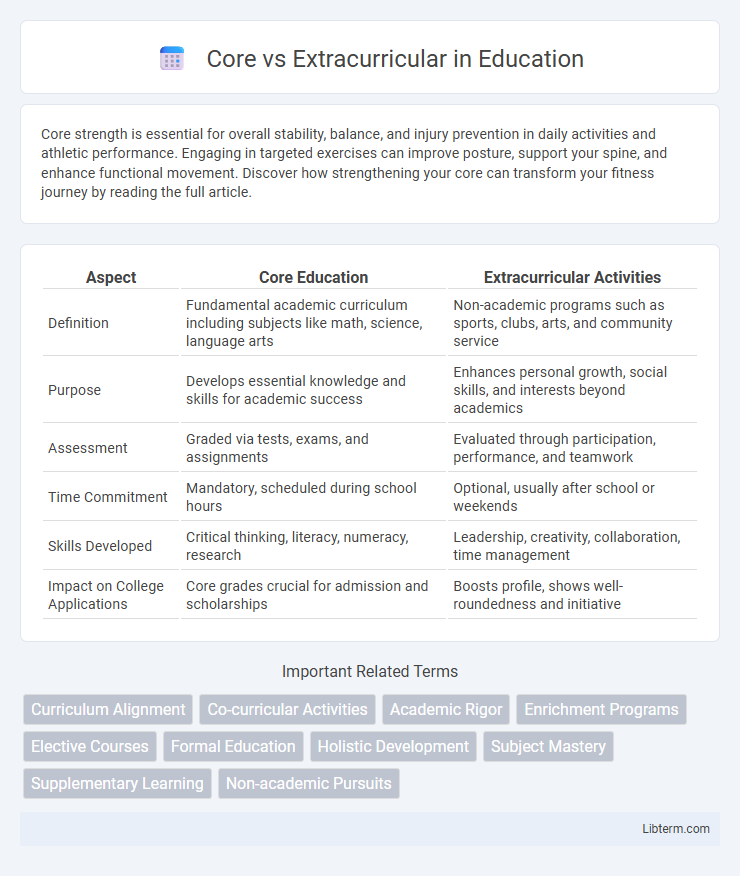Core strength is essential for overall stability, balance, and injury prevention in daily activities and athletic performance. Engaging in targeted exercises can improve posture, support your spine, and enhance functional movement. Discover how strengthening your core can transform your fitness journey by reading the full article.
Table of Comparison
| Aspect | Core Education | Extracurricular Activities |
|---|---|---|
| Definition | Fundamental academic curriculum including subjects like math, science, language arts | Non-academic programs such as sports, clubs, arts, and community service |
| Purpose | Develops essential knowledge and skills for academic success | Enhances personal growth, social skills, and interests beyond academics |
| Assessment | Graded via tests, exams, and assignments | Evaluated through participation, performance, and teamwork |
| Time Commitment | Mandatory, scheduled during school hours | Optional, usually after school or weekends |
| Skills Developed | Critical thinking, literacy, numeracy, research | Leadership, creativity, collaboration, time management |
| Impact on College Applications | Core grades crucial for admission and scholarships | Boosts profile, shows well-roundedness and initiative |
Understanding Core Activities
Core activities refer to the essential tasks or functions central to an organization's mission or an individual's primary responsibilities, often directly linked to academic or professional goals. Understanding core activities enables efficient resource allocation, improved performance, and clearer goal-setting by focusing on fundamental priorities. Unlike extracurricular activities, which enrich experience and skills outside the primary role, core activities maintain the foundation for success and progression.
What Are Extracurricular Activities?
Extracurricular activities are structured, non-academic pursuits that students engage in outside the core curriculum, including sports, clubs, arts, and volunteer work. These activities promote skill development, teamwork, leadership, and social interaction, complementing academic learning. Participation in extracurriculars is linked to improved college admissions prospects and holistic personal growth.
Key Differences Between Core and Extracurricular
Core subjects consist of essential academic disciplines such as mathematics, science, language arts, and social studies, forming the foundation of a standardized curriculum required for graduation. Extracurricular activities encompass non-academic pursuits like sports, music, clubs, and volunteer work, promoting personal development, social skills, and interests beyond the classroom. The key difference lies in core subjects' focus on academic knowledge and skill-building, while extracurriculars emphasize holistic growth and experiential learning.
Importance of Core Curriculum
Core curriculum forms the academic foundation by emphasizing essential subjects like mathematics, science, language arts, and social studies necessary for cognitive development and critical thinking skills. Mastery of core subjects directly impacts standardized test performance and college readiness, which are pivotal for academic and career success. Extracurricular activities complement this foundation by fostering social skills and personal interests but do not replace the fundamental knowledge and competencies gained through the core curriculum.
Value of Extracurricular Involvement
Extracurricular involvement enhances essential skills such as teamwork, leadership, and time management that core academics alone may not fully develop. Participation in clubs, sports, or volunteer activities provides practical experiences that improve social interaction and problem-solving abilities. Colleges and employers highly value these experiences as indicators of a well-rounded, motivated individual.
Academic Impact: Core vs Extracurricular
Core academic subjects such as mathematics, science, and language arts have a direct and measurable impact on standardized test scores and college admissions criteria. Extracurricular activities enhance critical soft skills like leadership, teamwork, and time management, indirectly supporting academic success by promoting student engagement and motivation. Balancing rigorous core coursework with diverse extracurricular involvement fosters holistic development and improves overall academic performance.
Skills Developed in Core Education
Core education develops foundational skills such as critical thinking, problem-solving, communication, and analytical reasoning essential for academic success and lifelong learning. It emphasizes mastery of literacy, numeracy, scientific inquiry, and social studies, fostering intellectual discipline and cognitive development. These skills form the basis for advanced knowledge acquisition and professional competencies in various fields.
Skills Gained Through Extracurriculars
Extracurricular activities develop essential skills that core academic subjects may not fully address, such as teamwork, leadership, problem-solving, and time management. Participation in sports, clubs, or volunteer work fosters interpersonal communication and adaptability, which are highly valued in both academic and professional settings. These skills gained through extracurricular involvement complement core knowledge, enhancing overall personal and career development.
Balancing Core and Extracurricular Commitments
Balancing core academic subjects such as math, science, and language arts with extracurricular activities like sports, music, or clubs is essential for holistic student development. Effective time management and prioritization help students excel academically while pursuing personal interests that enhance skills and social connections. Maintaining this balance supports mental wellness and fosters a well-rounded educational experience preparing students for future challenges.
Core and Extracurricular: Building a Well-rounded Profile
Core academics provide essential knowledge in subjects like math, science, and language arts, forming the foundation for intellectual growth and college readiness. Extracurricular activities, ranging from sports to arts and volunteering, develop soft skills such as leadership, teamwork, and time management. Combining strong core performance with diverse extracurricular involvement builds a well-rounded profile that appeals to colleges and employers seeking versatile candidates.
Core Infographic

 libterm.com
libterm.com